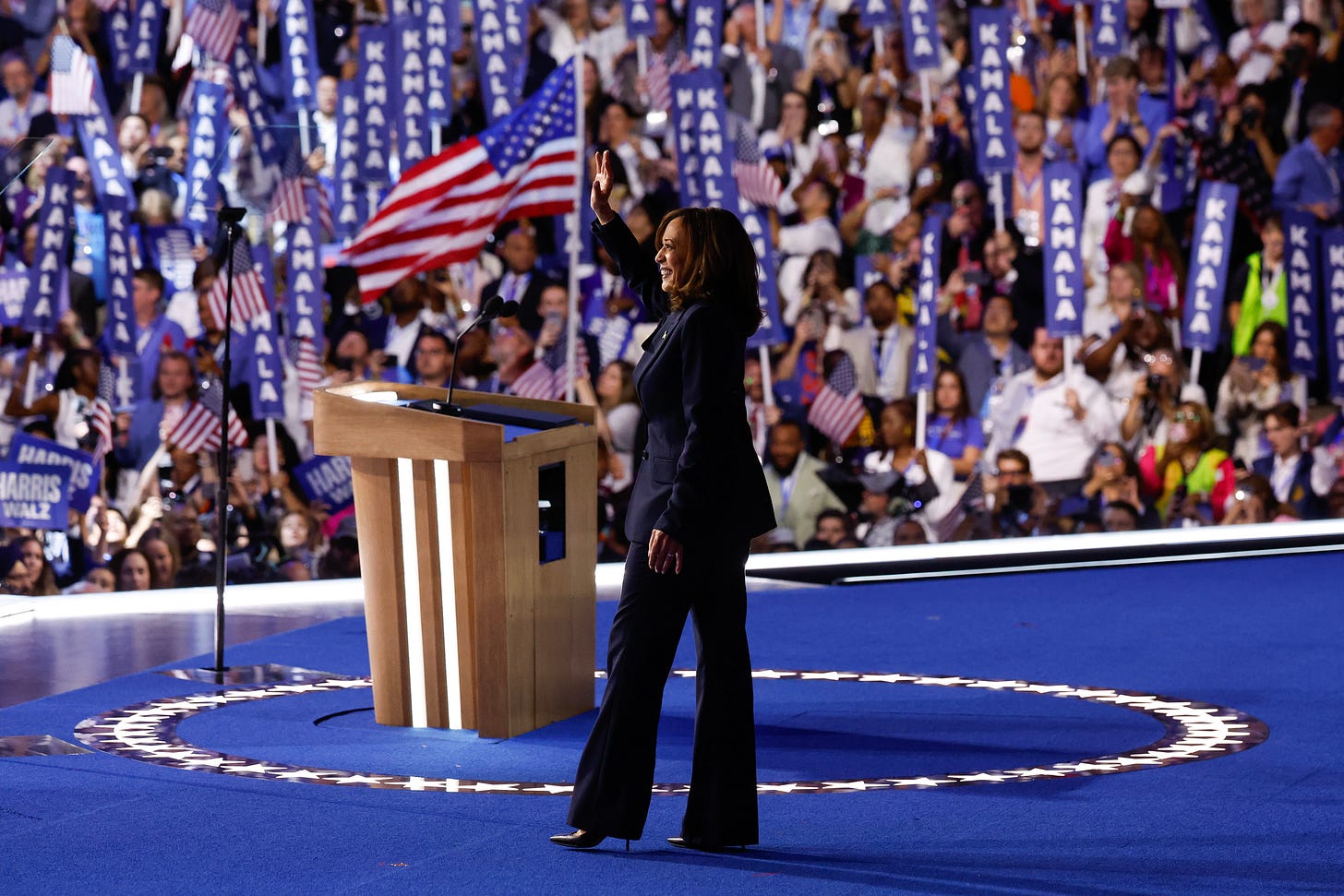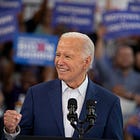Why "we're not going back" is the perfect theme for 2024
Harris is referring to more than just the orange man.
🚨 This special, five-edition week of PN is made possible by paid subscribers 🚨 If you aren’t one already, please sign up to support our independent journalism.
“We not goin’ back!” hip hop legend Lil Jon chanted to hype up the Georgia delegation at the Democratic National Convention in Chicago this week.
“We’re not going back” is, of course, perhaps the central slogan of Kamala Harris’s campaign for the presidency. Lil Jon shouted it outright — but one of its virtues as a campaign riff is that it provides thematic context for a progressive message which was part of the convention pageantry, but wasn’t always explicitly stated.
Harris leaned into this theme last night during her strong speech to close out the DNC.
“We know what a second Trump term would like. It's all laid out in Project 2025, written by his closest advisers, and its sum total is to pull our country back to the past. But America — we are not going back,” she said. (Watch below.)
This talking point is a potentially radical, inspiring message framed in a upbeat and non-confrontational way — which is part of the reason Harris’s speeches over the last month has been received so enthusiastically.
We’re not going back to Trump
At its most direct and obvious, “We’re not going back” means that we’re not going back to the presidency of Donald Trump, who responded to Harris’s speech by having a meltdown that began on Fox News and ended on Newsmax.
Trump, very unusually for a mainstream party nominee, was president already. He lost the 2020 election to President Biden and then incited a coup attempt that culminated in the January 6 attack on the Capitol. There was a brief moment in January 2021 where it seemed like his hold on the GOP was slipping, but Republicans quickly circled the wagons around him, and he wasn’t seriously challenged on the way to locking up his third straight Republican nomination.
This year’s general election was initially shaping up as a rematch between Biden and Trump. But when Biden dropped out after his rough debate performance and endorsed Harris, it gave her the opportunity to run not (just) on the current administration’s achievements, but also as a figure of change.
“We’re not going back” means turning the page on the Trump era with its tiki-torch Nazis, mismanaged pandemics, massive tax cuts for the rich, and assault on reproductive rights. It means dislodging the orange aspiring authoritarian from the place he’s occupied over the last nine years at the center of American politics.
This mix of comforting experience and anti-establishment hope has been the sweet spot for just about every successful Democratic presidential campaign of the last 50 years. In 1976, little-known Georgia Gov. Jimmy Carter ran as an outsider and an alternative to Watergate-era Washington corruption. In 1992, little-known Arkansas Gov. Bill Clinton ran as an outsider and an alternative to both the Reagan/Bush conservative administration and to a Washington Democratic party that he portrayed as liberal and out of touch. In 2008, young Sen. Barack Obama ran as an outside insurgent against Washington’s pro-Iraq war policy consensus.
A note from Aaron: Working with great contributors like Noah requires resources. If you aren’t already a paid subscriber, please support PN by becoming one.
Unlike Donald Trump (and many Republican candidates of the Trump era) Carter, Clinton, and Obama all had conventional qualifications for president to go along with their anti-establishment positioning. But they were also offering change and a hope for something different. That energized their campaigns and their voters.
“We’re not going back” acknowledges Biden’s achievements, while claiming a mandate for more progress rather than retreat. And it positions reality-television entertainer Trump as the boring old guard.
Trump is really old
The DNC has embraced that message with glee.
First, speakers have explicitly pointed out that Trump, at 78, is the oldest candidate to ever run for president. Former president Bill Clinton, who held the Oval Office a quarter century ago, even made an age joke at Trump’s expense — something that would’ve been on nobody’s DNC bingo card two months ago. (Watch below.)
Obama, in his speech, described that Trump as “a guy whose act — let’s face it — has gotten pretty stale.” Tim Walz said it’s time to “turn the page on Donald Trump.”
Democrats have also used a very common anti-establishment charge against Trump — corruption. One of the Democratic themes at the convention is the argument that, as Hillary Clinton put it in her speech, Trump “only cares about himself.” (Perhaps the convention’s most surreal moment was when the crowd started chanting “lock him up!” during Clinton’s speech. You can watch that below.)
Shawn Fain, president of the UAW, called Trump a “scab.” AOC said Trump was a “two-bit union buster” who “would sell this country for a dollar if it meant lining his own pockets and greasing the palms of his Wall Street friends.”
The New York Times correctly points out that these attacks are meant to diminish Trump. But they also position him as an out of touch Washington elite. Trump is used to preening himself as a populist outsider. But now it’s Harris who gets to present herself as the representative of the people, preparing to toss out a rich asshole, self-dealing Washington insider.
We’re not going back to an America that wasn’t that great
“We’re not going back” is a way to remind people that Trump is old, rich, and that we’ve been there and done that. But it’s also, more subtly, a reminder that Trump represents a reactionary, bigoted American tradition which we should reject.
In 2016, Hillary Clinton made the fact that she could be the first woman president a central campaign theme. In 2008, the fact that Obama might be the first Black president was a huge aspect of campaign coverage. In contrast, Harris has mostly avoided explicit appeals to her own potential status as the first Black woman president, including during her DNC speech Thursday. She is, presumably, hoping to sidestep some of the reactionary backlash that helped Trump win in 2016.
But of course Harris’s identity, and the Democratic Party’s commitment to inclusion and to rights for women and Black people, is of central importance to the campaign. “We’re not going back” is a way to highlight in a firm but non-confrontational way that we’re not going back to a world in which women couldn’t get abortion services, in which Black people couldn’t vote, in which LGBT people couldn’t marry or even hold hands in public. The slogan is an acknowledgement — rare in presidential campaigns — that America has a long, ugly history of injustice, and that we can and have to do better.
The DNC highlighted this need to do better in a range of ways. As political scientist Julia Azari points out, the first night of the convention was devoted to women politicians: state level elected officials, AOC, Hillary Clinton. In a memorable moment from Wednesday, Michigan AG Dana Nessel vowed, “I got a message for the Republicans and the justices of the US Supreme Court: You can pry this wedding band from my cold, dead, gay hand." (Watch below.)
More, the Democrats had numerous speakers discuss their horrific experiences in being denied abortion care. It was a stark statement of what going backwards means — and of the alternative, a party, and a country, in which women have full rights and are fully represented in leadership positions and in public life.
Not just white men
In that context, the gracious, enthusiastic endorsements of Harris from Hillary Clinton and Biden took on additional resonance.
They gave their blessing to a younger generation taking over — one that is less white and male than leadership has been in the past. Equality means, in part, that white men (and white women) have to accept that they’ll occasionally have to cede leadership to Black women. Watching Walz, and the Clintons, and the Bidens, and Obamas endorse Harris as their leader was a dramatic, if implicit, acknowledgement and endorsement of change.
Importantly, this change has been organic. Women are now 43 percent of the House Democratic caucus. That suggests that Democrats have taken concrete steps towards gender parity in leadership.
Similarly, the rapturously received speeches by Barack and Michelle Obama underlined that Democrats are building a tradition of Black leadership at the highest levels of the party. There’s a lot of work to do — and the recriminations over the DNC’s refusal to allow a Palestinian-American Democrat to speak at the convention indicates one way in which all is not well under the party’s big tent.
Nonetheless, Democrats can in many respects demonstrate that they are breaking with America’s worst traditions. The party now is a party of women, of Black people, of Black women. It’s a party enthusiastically pushing for labor rights and against corporate monopolies. And, as Lil Jon says, “We not goin’ back.”
That’s it for this week
We’ll be back with more Monday. If you appreciate this post, please support Public Notice by signing up. Paid subscribers make this newsletter possible.
Thanks for reading, and have a great weekend.







Excellent. “We are not going back” is a strong pushback to the fear that pushes hate and division. The joy of going forward instead of the fear of it is a great theme. We always have gone forward regardless. People need to get used to it, open up to it. One line has been that this enriches us all as a nation, it doesn’t take away from us. It refuses the fear selfishness and mean spirit that Trump and the Republican party is projecting as a vision for us. We reject it. We reject Trump.
While it would have been great to have a Palestinian voice that would propel the campaign forward, I think they were wise to avoid the risk at the DNC. In a highly choreographed and staged event where every speech, voice, and message is designed to strategically help the campaign, any dissonance risked both becoming the story and disrupting the overall drive toward crescendo. There are legitimate issues to work through - just not night 4 of the DNC on the main stage.
Further, the larger context is the non-dimestic audience - the speeches were as much signalling to allies and enemies abroad and the messages needed to also be in the service of ongoing negotiations and diplomacy. We like to think this is just a big US political event, but outside, the messages will be used for good or ill.
To end on a high note - the DNC was overall fabulous, well done, and inspiring. Despite much work to do, we're not going back.